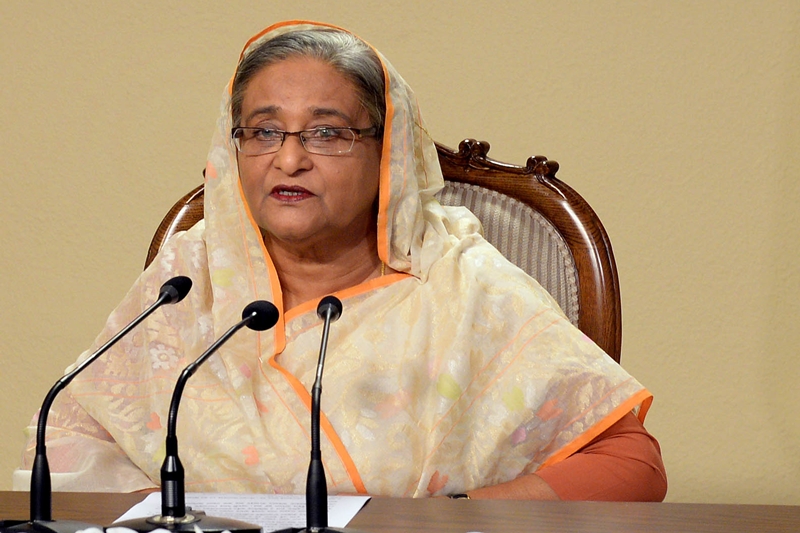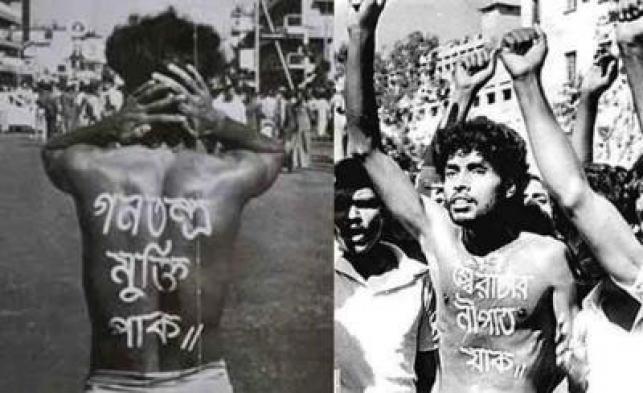By

A well-wisher is said to have once warned Sheikh Mujibur Rahman, the charismatic leader known as “Bangabandu” or Friend of Bengalis, that some Bangladeshis were plotting his downfall. “Nonsense!” he retorted. “I am the father of my people. Does any son ever kill his father?” Had Mujib been less intoxicated with his own grandiose role, he would have known that history cites several ambitious and impatient sons who have done exactly that. Rightly or wrongly, they felt frustrated by a dominating father.
Mujib’s beleaguered daughter, Sheikh Hasina Wazed, cannot afford to forget that episode. Neither can Bangladesh’s friends in the government of India. Both know that no one could have been more popular than Sheikh Mujib. Yet, he also eventually aroused the bitter enmity of a group of military men, civil servants and politicians who ultimately mowed him down with almost all members of his family, and then slaughtered his top aides. Why? The question must be faced squarely if outrages like the recent murderous spree in Dhaka when 20 innocent people were massacred are not to become as permanent a feature of Bangladeshi life as they are in Syria or Iraq.
Two factors bear stressing in this context. First, those who imagine that Bengalis, whether in Bangladesh or West Bengal, are incapable of brutality, have forgotten the bloody Direct Action Day, August 16, 1946, when Calcutta was converted into an abattoir running with blood. Second, as this column has reiterated before, the late Zulfiqar Ali Bhutto noted in 1971 that “Muslim Bangla” should make up its mind whether it was Muslim first or Bangla first. If the first, he said, Bangladeshis (not that he would ever have dreamt of using the term then) should return to Pakistan. If the latter, they should seek merger with West Bengal.
The two conditions remain as true today as in the past. Bangladeshis have a proven capacity for violence. There is also a strong jihadi strain in their psyche. Describing the sequence of events on the ground in 1971, a Hindu peasant told me that Bengali Muslims first began to massacre the so-called Biharis (Urdu-speaking Muslim migrants from Calcutta) in their midst. Then, when the Pakistani troops arrived, the two jointly turned on Hindus.
Bangladesh never was the socialist, democratic Elysium of Indian mythology. (Neither is India of course.) Any realistic Indian policy must take into account the reality of the Bangladeshi temperament, and the extent to which it can be influenced by its love-hate, big-neighbour-small-neighbour relationship with India and the appeal of pan-Islamic forces that exploit this complex.
The so-called Islamic State terrorist organisation claims responsibility for the carnage. Mrs Wazed would much rather throw blame over the Bangladesh Nationalist Party led by her arch-rival, Khaleda Zia, and the obscurantist domestic Islamic parties with which it is allied. The two are not irreconcilable for the BNP and its partners may have established links with the IS. The identity of the men behind the bloodbath may be relevant now that the dust is lifting to reveal well-to-do, well-educated and well-connected young men who did not imbibe their theocratic fundamentalism in madrasas as in Pakistan or through the deprivation of refugee camps, as in West Asia. They are the inhabitants of Dhaka’s fashionable Gulshan district. Most of the 20 hostages were foreigners. They were siezed in an overpriced breakfast place patronised by privileged expatriates, but also a favourite with rich young Bangladeshis to celebrate birthdays and anniversaries. Reportedly, the gunmen walked into the restaurant, yelled “Allah ho Akbar!” and opened fire. They appear to belong to the “radicalised” and “impressionable” young elite that is at the core of terrorist organisations in many countries.
Some reports suggest they owed allegiance to the Jamaat-ul-Mujahideen Bangladesh, which has ties with the Jamaat-e-Islami, the BNP’s former coalition partner. Others believe it was the Ansarullah Bangla Team, founded by a former army officer who was accused of plotting a coup against Mrs Wazed. Both are extremist organisations. Both are implacably opposed to the ruling Awami League. The question is, would these young people be driven into the arms of such militant groups if the prime minister had allowed them – or anyone else for that matter – some space for legitimate dissent within the political system?
It must be remembered that in 2014, Mrs Wazed won a controversial mandate when she stood virtually unopposed in the Jatiyo Sansad elections. Most opposition parties – including Mrs Zia’s BNP and the Jamaat-e-Islami – boycotted the polls. Since then, Mrs Wazed has consistently curbed opposition voices. Mrs Zia was placed under house arrest when she tried to address political rallies. Some opposition leaders have been executed, allegedly for crimes committed during the 1971 war. Some have gone underground or fled abroad amid rumours of persecution by the authorities. There are reports of extra-judicial killings. The minorities – read Hindus – again feel victimised. The clamp-down on the BNP leaves the field for dissent to the Jamaat-e-Islami.
History repeats itself. Within a few years of his triumphant return from a Pakistani jail where he had been condemned to death, Mujib so far forgot the cause he had championed as to abolish Bangladesh’s vibrant free press, force its robust multi-party system into the straitjacket of a single-party system, that party being his Awami League, and established personal dictatorship. Instead of restraining him, Indira Gandhi, who had herself abridged India’s democracy with her Emergency dispensation, supported and encouraged Mujib in his authoritarian new role.
History continues to repeat itself. India still extends unstinting support to the Awami League government. It believes – as it did with Sheikh Mujib in 1975 – that the Awami League provides the best neighbour we can expect, and that it must be supported in order to strengthen secular, democratic forces against the rising tide of Islamist bigotry. Mrs Wazed has powerful friends in New Delhi’s corridors of power, and they are responsible for a shortsighted policy that obliges India to place all its foreign policy eggs in one basket.
After Mujib’s murder, General Ziaur Rahman was desperately anxious for visible tokens of India’s friendship. But he was also a hard-headed pragmatist, and it was he who first proposed what is today the South Asian Association for Regional Cooperation. He conceived the association as a protective umbrella that would defend the region’s smaller countries against Indian hegemony, not just in military matters but in matters such as boundary disputes and sharing natural resources.
India handled Zia with reserve. It is now openly suspicious of his widow and her policies. But India’s own national interest demands it should rethink its blind support for Mrs Wazed, and use its influence with her to ask some hard questions. The repeated breakdown of law and order on her watch cannot always be blamed on BNP mischief. The Awami League must be advised not to subordinate its governmental responsibilities to the battle of the begums. If any outside force has any influence with Mrs Wazed, it’s the Indian government. Delhi is closer to Dhaka than is imagined.
Source: FreePressJournal.In








